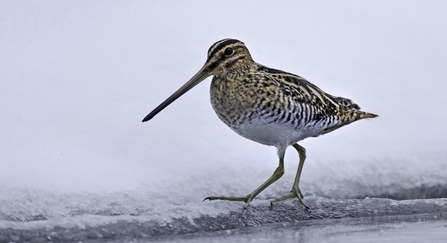After filling up on hot tea and coffee to kick start our internal central heating systems, we ventured out on what was otherwise a beautiful morning, with uninterrupted azure blue skies above us and crunchy grass beneath our feet.
Pausing briefly to talk about the wider reserve, its history and ongoing management, an impromptu question asking how long people had been members with Durham Wildlife Trust highlighted the incredible long-term support offered by so many people to our local wildlife and the journey they have been on with the Trust, as it has changed over the last fifty years.
As we passed the grazing Exmoor ponies, whose breath billowed away from them like smoke from chimineas, there was of course one worry that was shortly about to manifest.
The thing about wading birds is that, generally, they like to wade. They frequently have long legs to enable them to do so and/or long bills that enable them to feed in either soft exposed mud or substrate within reach below the surface. Unfortunately for waders, they are not woodpeckers. They possess limited capability to break their way through ice or to penetrate ground frozen so it is as hard as tarmac. Our expectations for a wader-fest were therefore somewhat muted, and unfortunately realistic.
To make some room in the hide, half of the group took a walk to our imaginatively named ‘Pond 4’ to see if there was anymore to be seen there. A solitary moorhen felt, with so many expectant eyes on it, under pressure to do something entertaining. Alas, it succumbed to stage fright and dived into vegetation.
Working our way back to the hide, we paused to admire a plucky long-tailed tit sat atop a tree and loudly advertising its presence. After an uplifting conversation about the realities of losing high frequencies from your hearing as you age and the impact this has on your ability to hear certain species we returned to the bird hide with a spring in our step.
Under the stewardship of one of our newest trainees, Mary-Anne, and our Trustee and expert birder, Peter Bell, the ‘hide team’ had made the best of the sub-optimal birding conditions and amassed a very respectable list of sightings. The highlight of which, thanks to a visiting birder for pointing out as it dropped in, was a Mediterranean gull. Although gradually becoming more widespread, this is still a relatively rare species and certainly noteworthy addition to any day’s birding.
More common, but often overlooked due to their cryptic camouflage is the snipe. And having one showing fantastically well in front of the hide is just the type of perfect encounter that leaves a lasting memory, and more than justified the early start and frozen fingers and toes.


